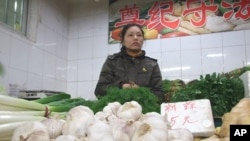Over the last few months garlic prices have risen 40 times in some parts of China, the world's main garlic supplier. A smaller garlic crop and frenzied speculation gave consumers nationwide a reason to complain at the market, just as some are hoping to increase their garlic intake to help counter the H1N1 flu.
This is a typical conversation one might overhear in a local Beijing market - a customer and vegetable seller commiserating over the rising cost of produce.
Wang Yanlin has been selling vegetables in this market on Beijing's east side for five years now. She says in the last month or so most customers comment on the rising price of one item in particular: garlic.
She says her wholesale price for half a kilogram of garlic rose to 65 cents this year, up from around 20 cents last year.
Beginning this fall, China has been experiencing a garlic bubble. Prices rose forty times in some areas of Shandong, China's main garlic-growing province. In big city wholesale markets, garlic prices increased ten times, and consumers nationwide often pay four times more at the store. For comparison, the prices of commodities like crude oil and copper just about doubled this year.
China supplies three-quarters of the world's garlic. Chinese garlic is often cheaper because of lower labor costs. Last year the financial crisis lowered demand, and much of the garlic harvest went unsold. This prompted farmers to plant around 50 percent less this year.
The impact of the garlic crop shortfall was exacerbated by speculators rushing in to buy up harvests. Because garlic does not spoil quickly, it is possible to purchase and delay resale until the prices go up. Chen Shuwei, an analyst at Beijing Orient Agribusiness Consultants, says the garlic market is small and therefore easy to manipulate.
Chen says even though farmers planted less garlic this year, their actions do not influence the market as much as trade does. Many of the speculators were not high-level business-types. Chen heard about a group of warehouse workers in Shandong who earned millions of Chinese yuan by buying and selling 700 tons of garlic.
Analysts say this bubble is a symptom of the liquidity that followed too much bank lending as part of China's economic stimulus policy.
Some in the garlic industry argue that garlic prices often fluctuate if you take a longer view.
Andy Chen is a founder of Jining Land Produce, an international produce supplier based in Shandong. He says garlic was not always a cheap commodity.
Garlic trader Chen says in 2007 garlic prices dropped too low, and the current price hike is partly a market correction. Both Andy Chen and analyst Chen Shuwei predict garlic prices will eventually come down slightly, but not significantly.
Many Chinese media reports have cited another reason for the garlic bubble. Some say there has been an unusually high demand for garlic because traditional Chinese doctors are recommending garlic to protect against the H1N1 influenza. In the city of Hangzhou near Shanghai, state-run media reported a high school bought more than 400 pounds of garlic for student lunches to help boost their immune systems.
Traditional Chinese medicine doctor Lan Yifang recommends his patients eat a small amount of garlic every day to help prevent colds. He says, much like penicillin, garlic has a spectrum of positive effects on people's health.
Dr. Lan says garlic strengthens the immune system, which helps in both prevention and recovery from colds and even H1N1. He says traditional medicine in many Asian cultures, including Japan and South Korea, promotes eating garlic.
Meanwhile, an official at the Beijing Center for Disease Control says there is no scientific proof garlic can prevent the virus. H1N1 has killed more than 300 people in China.
Back at the produce market, one of Wang Yanlin's customers, also surnamed Wang, says he has to cut down on his garlic purchases because of the high prices. For health reasons he sometimes eats half a bulb over raw garlic.
Wang says garlic is good for the eyes, among other health benefits. The only downside he sees is the lingering bad breath.
Vegetable seller Wang Yanlin says over the last few months of price hikes she has been having trouble selling garlic.
She says the best vegetable to sell is cabbage, which remains cheap. She calls it the vegetable of the regular people.
News
Speculators Cause New Price for Garlic Market in China
update

Over the last few months garlic prices have risen 40 times in some parts of China, the world's main garlic supplier.



